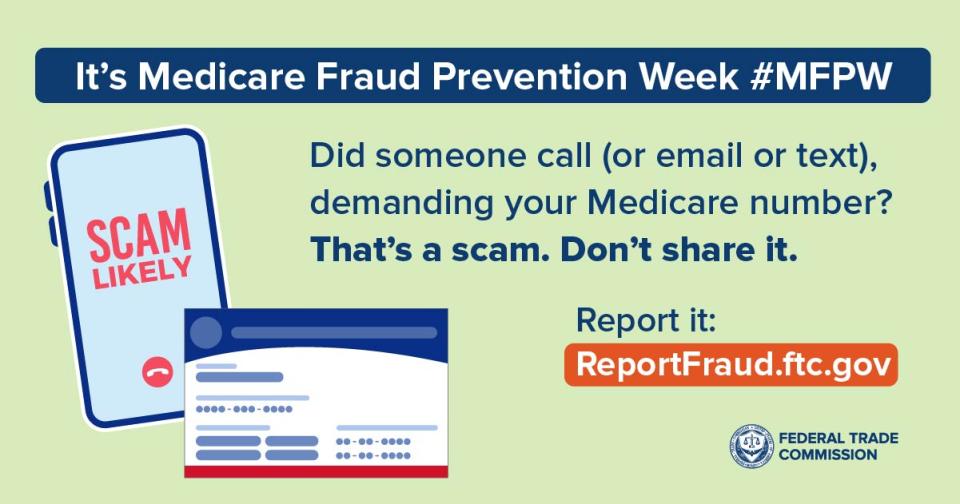Last year, the FTC got almost a million reports about impersonation scammers — fake government agents, pretend grandkids, bogus sweethearts, and others who took almost $2.3 billion from people across the country. So far this year, impersonation scams are still the most-reported fraud.
Scammers keep changing their stories to catch you off-guard. Some scams even ask you for your Medicare number. If anyone surprises you with a call, email, text, or message on social media and asks for money or personal information — no matter what story they tell — it’s most likely a scam.
During Medicare Fraud Prevention Week this week, learn about protecting your number from health care fraud. Then, take steps to keep impersonators away from your money and valuable information:
Reduce unwanted calls and email
- Use call blocking technology or devices that stop unwanted calls — like scams calls and illegal robocalls — before they reach you.
- Use email spam filters to reduce phishing scam attempts, and set your computer software to update automatically.
Keep information private
- Medicare won’t call or text to ask you for money. Even if your Caller ID says it's Medicare, it could be faked. Don’t share personal or financial information with anyone who calls, emails, or texts saying they are from a government agency.
- Don’t click links or open attachments in email and text messages, even if they seem to come from Medicare or a company you know. They could be messages phishing for your account numbers, passwords, or other information.
Protect your money
- Refuse to pay anyone who demands payment by wire transfer, gift card, or cryptocurrency. Only scammers tell you to pay these ways. It’s hard to track those payments, and almost impossible to get your money back.
If you suspect a scam, tell the FTC: ReportFraud.ftc.gov.


Thank you for this information. I already knew this and am posting it on my Facebook Page.
Print and post this in buildings where Seniors live. Thanks!
I got a letter from Medicare saying my Medicare ID had been compromised and they were sending me a new Medicare card which I have received. Is that legitimate?
In reply to I got a letter from Medicare… by Linda Hall
Maybe you can call medicare and double check.
I've been getting calls from a call center that wants me to give them my Medicare number, and for a fee,will send me a metal card that "won't wear out".
I asked how they got my information - they know my age, and then they hang up.
This may or may not be a scam, but I am not taking any chances. To me, their goal is to get my Medicare information and address. I recommend hanging up on these people.
I am on the Do Not Call List - it seems like a wasted effort, but the number is still there. Someday, maybe it will be useful.
I answer ONLY calls coming from numbers in my contacts list. If an unfamiliar caller is really calling me, they'll leave a message regarding familiar circumstances. Same for texts and emails. It's easy to report spam for what it is, and easy to block robocalls and other garbage.
These are good tips. However I’m the sort of person who can’t relax until the problem is solved. I hope the scammers are caught and justice is served! The seniors will all sleep well.
I read all your alerts I am up to date on everything thank you
I'm so tried of these schemer calling. every day all day, I block they call some of them manage to still called back.I am so tired of these peoples
I also received mail stating a person was being removed off my medical insurance. Also looks like the person's name is from another country.
I have been getting several calls everyday ID MEDICARE ASSIST, from different cities. As suggested I changed the settings on my mobile phone to silent unknown numbers, that helps. I don’t have caller ID on landline, so I have no choice to pick up calls. Thank you for informing public.